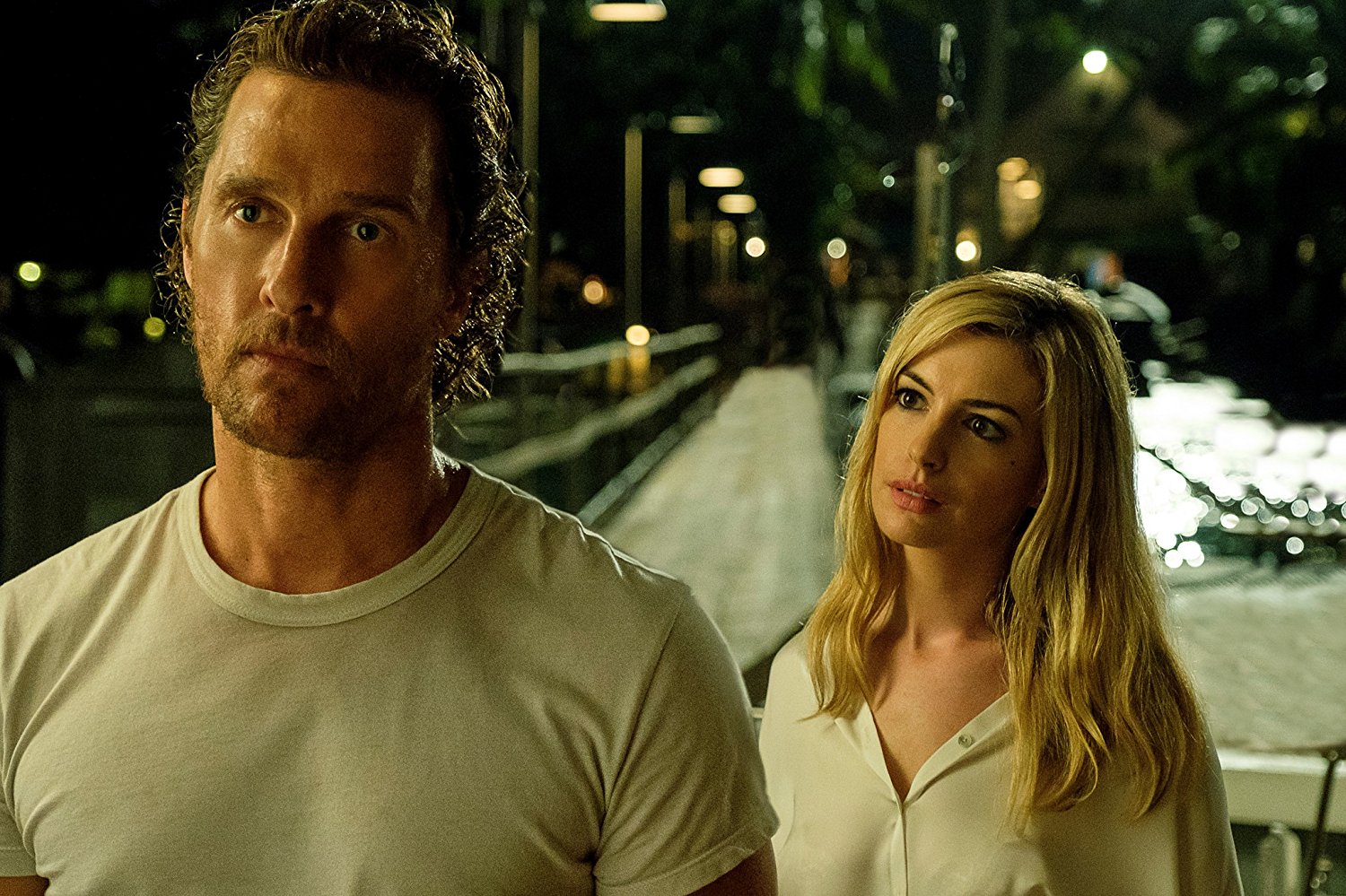On the soporific Plymouth Island, somewhere tropical and isolated, everyone knows Baker Dill’s (Matthew McConaughey) business. Information is more likely to be passed on by bartenders and grocery clerks than newspapers or the Internet, and rumors about the protagonist of Serenity (2019) hurriedly solidify into facts. At times, it seems like Dill is the center of the island’s life, while a rotating cast of characters is inserted to move his story along. Though everything leads back to Dill, the film’s plot is still muddy. Director Steven Knight’s Serenity has traces of brilliance that often get lost in the film’s confused narrative.
Dill is a mysterious fishing captain with a violent streak who scrapes out a living by charging tourists for trips on his boat, the Serenity. His real vocation, however, is hunting a giant tuna he calls Justice. Serenity takes too long to get to the bottom of Dill’s angst, shrouding him in mystery for the first half of the film. Eventually, we work out that he’s an Iraq War veteran with a son by an ex-lover and that his past has made him jaded and brusque. However, it’s a long, frustrating ride to get there.
Dill’s character also falls short in terms of likeability—he is cruel to his only friend and first mate, Duke (Djimon Hounsou) and is too preoccupied with chasing an imaginary fish to focus on life around him. It feels impossible to be invested in the fate of a character who seems so thoroughly withdrawn from the world. The only thing that draws his attention away from Justice is his estranged son, Patrick (Rafael Sayegh), who he hasn’t seen since he returned from war. Patrick and Dill seem to have a mysteriously strong connection for a pair separated by hundreds of miles and half of a decade, but their relationship is hardly addressed until the last quarter of the film. Instead, much of the film revolves around Dill’s drinking and sexual partners. This focus leaves the father-son bond too skeletal to be interesting.
In Serenity, McConaughey trades his cowboy hat for a fishing rod but keeps his trademark overacting. In scenes at the climax of the film, his intensity becomes almost comical, and it’s hard to fight back a laugh at the earnest, unbridled energy that McConaughey exudes. This being said, McConaughey’s brilliance shows in the quietly high-stakes moments. There are times when Dill doesn’t say a word, but McConaughey manages to portray his anger and pain perfectly.
At the end of the day, though, this movie belongs to Anne Hathaway, who portrays Karen, Dill’s ex-lover. She perfectly walks the line between damaged victim and fierce mother trying to protect her son. When she comes to Plymouth Island to commision Dill to kill her abusive husband, she doesn’t come as a damsel in distress. Rather, she is a parent with a steely desire to right the wrongs life has dealt her. Hathaway is calculating yet desperate, unafraid to use her body and her money to push Dill into obeying her orders. She’s also a gem in the scenes with her abusive husband, Frank (Jason Clarke). Karen and Frank have a violent, toxic relationship that’s hard to watch on the big screen. In their scenes together, her disgust is palpable.
But an uneven, yet impressive performance from McConaughey and a strong showing by Hathaway can’t save Serenity from itself. The first and second halves of the film feel like two separate movies, only linked by the vaguely supernatural air of Plymouth Island. What starts as a nautical drama quickly warps into a sci-fi thriller as fishing shots change to long lines of code, and the twist at the end is foreshadowed too much to be a real surprise. Just like Justice pulling Dill’s line farther and farther into the sea, Serenity’s big reveal feels like it struggles to break free.
Serenity’s muddied storyline detracts from the real message of the film. The point of the movie is rather bleak: an obsession with morality doesn’t change reality, and it’s easier to vicariously live our most violent instincts through other people. But the movie also poses difficult, yet interesting questions. Is murder acceptable if the victim is truly evil? Is killing an abuser worth the irreparable injury to one’s soul? Are we in control of our own destinies, and does that even matter? Can a person who has seen nightmares become too damaged to fully return to life around them? Serenity can’t answer these queries, but it doesn’t need to.
Despite a shaky, somewhat ludicrous storyline, Serenity displays occasional technical prowess that makes it a joy to watch. Audio mixing often goes unnoticed in a movie, but Phil Lee’s sound design is pure genius. We can hear the clacking of keys intertwined with the crashing of waves, and the voice of Plymouth Island’s rather creepy yet enthused radio DJ guides us through the film’s two hours. Through some confusing themes and storylines, Lee manages to ensure that the audio effects not only make sense, but add value to the movie. Jess Hall’s cinematography also stuns. In moments of intense violence, Hall’s camerawork is elegant, making the ugliness of these scenes aesthetically pleasing.
Serenity seems inappropriately named because nothing about the film is tranquil. As credits roll, we’re left with more questions than answers and many moral dilemmas to process. Though the plotline is too convoluted to make it a leisurely watch, the best of Serenity is in the details.





